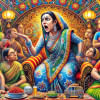2025 has finally arrived. As Dhakaites ushered in yet another year, there have been reports on social media about the hazards caused by rampant displays of fireworks, and noise pollution resulting from fireworks. Although there have not been any reported cases of fatality this time, cases of burn injuries have been registered at hospitals; countless Facebook posts have also narrated the horrifying effect our "celebrations" have had on pet animals. Amidst the noise, children and the elderly also suffer endlessly.
This begs the question; is it time to re-think New Year celebrations?
"Two years ago, on New Year's Eve, a burning lantern had landed on the electric wires some 4-5 feet from my balcony. I sprayed water at the lantern from the bathroom window near it until the fire was doused out. If the wires had caught fire and had reached the transformer, it could have been catastrophic."
Come 31 December, law enforcement agencies are on high alert to avoid untoward incidences of public drunkenness, harassment, and molestation that made headline news in the past. It must be said that under the new directives, there has been some sanity in our observance of New Year's Eve. That, unfortunately, cannot be extended to the use of fireworks and firecrackers.
It is a global phenomenon that the coming of the New Year is celebrated through elaborate firework displays. However, that "tradition" too is now being questioned. It is okay to celebrate, but at what cost?
"…Countries and cities are exploring alternative ways to celebrate New Year's Eve without fireworks, like light shows or drone displays. I wonder why we cannot do the same?"
Government directives released by the relevant ministry have urged people to refrain from using fireworks, firecrackers, and floating lanterns while observing New Year's Eve. All such unauthorised use is a violation of the law, and are punishable offences.
As per the law, violations of these rules may result in a penalty of up to one month of imprisonment or a fine of up to Tk 5,000 or both for the first offence. For subsequent violations, penalties may increase to up to six months of imprisonment, or a fine of up to Tk 10,000 or both. However, there has been a general disregard for this.
"We have faced such problems before and we successfully solved it. All we need to do is repeat what was done to bring about the social change"
Decades ago, sound and environmental pollution were major concerns during the observance of Laylatul Barat. Thanks to stringent measures in upholding the law and widespread social awareness measures, people can now observe Shab-e-barat with due religious and social fervour sans the crackers and the unnecessary fireworks.
Perhaps, there is a lesson to be learnt from this. Within a few days, the night sky of Old Dhaka will light up for the festival of Shakrain. While many will debate whether this was ever a Shakrain tradition, the fact remains that pollution levels will reach alarming levels on 14 January, given the nature of our celebration.
So, what could be possible solutions to this widespread menace?
Firstly, the law should be strictly enforced. We have seen the success of such measures in the late 1980s and early 1990s when Shab-e-Barat fireworks had become a social problem.
Secondly, citizen forums in many parts of Dhaka now oversee the welfare of the neighbourhood. These organisations should run campaigns discouraging the use of fireworks/firecrackers on days like 31 December and Shakrain. Flat Owner's Associations can also ban such activities within the apartment premises across the city.
Secondly, there should be widespread campaigns in schools and educational institutes on the damaging effects of our actions on animals, wildlife, and the environment. If we can instil values in children, they will not be interested in engaging in such harmful acts.
*** Quotes have been taken from Social Media.








Comments